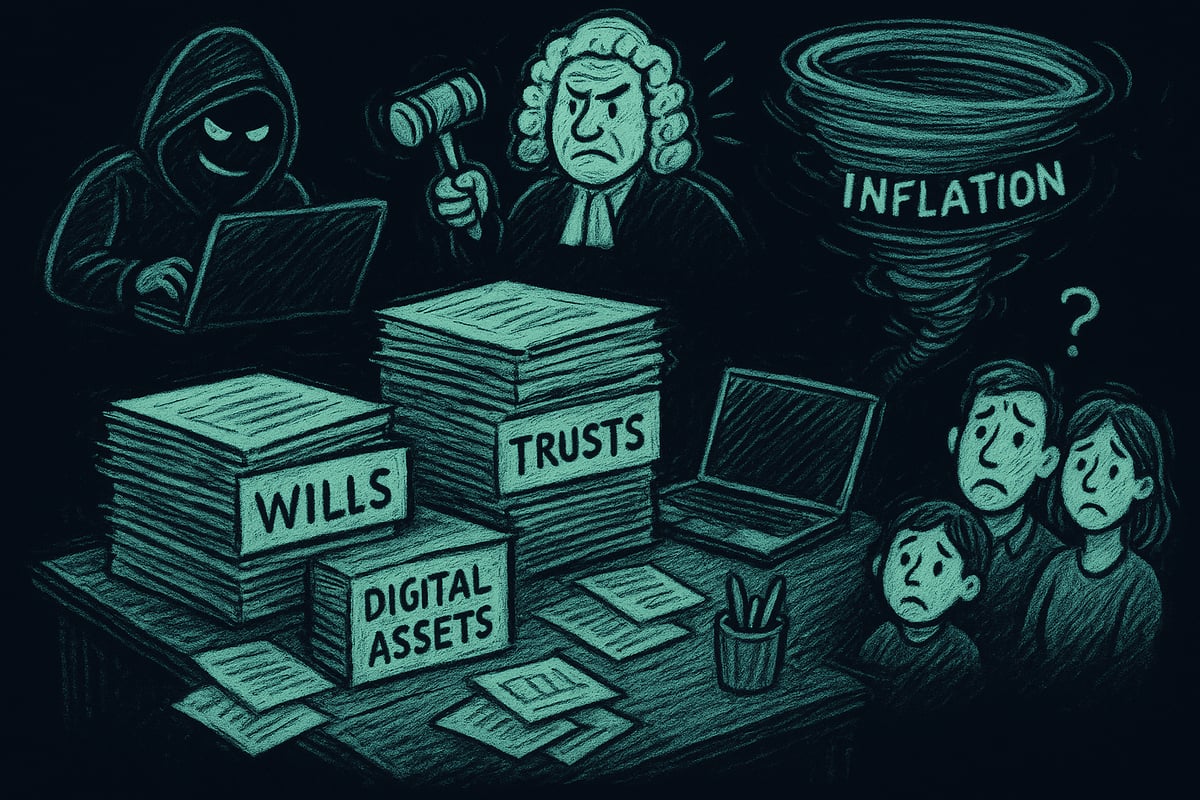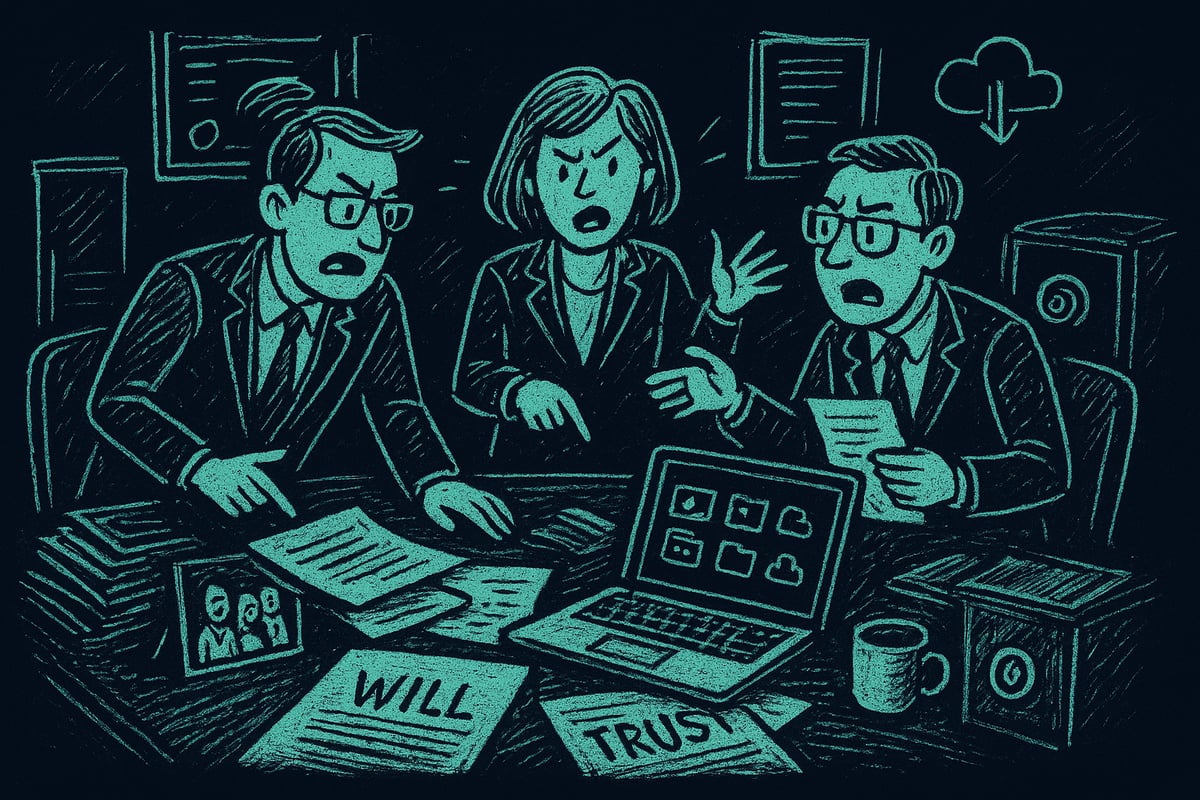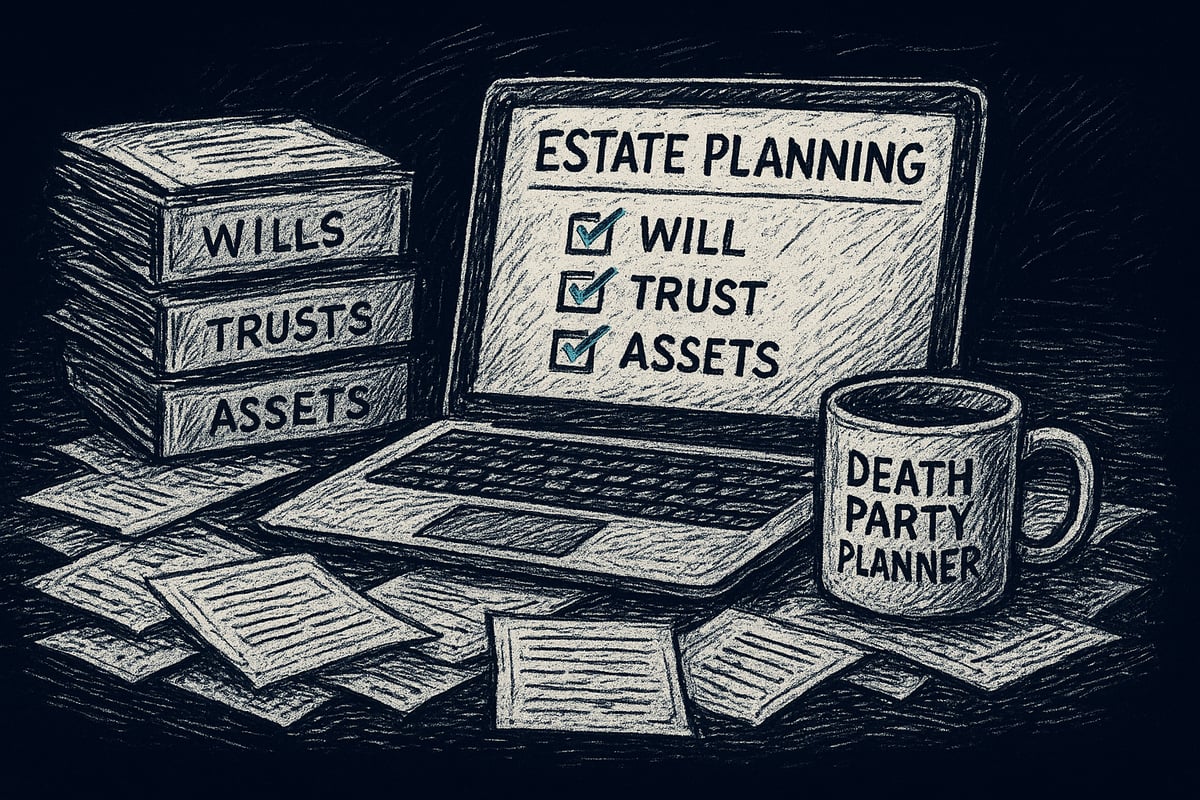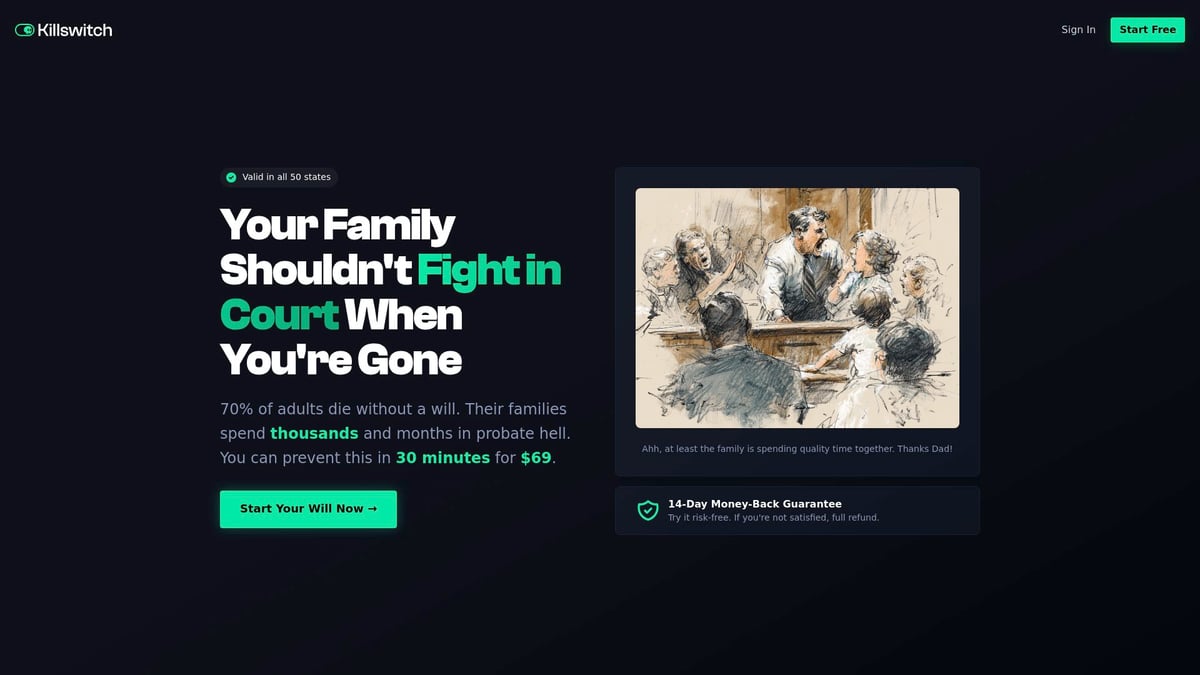Guide to Safeguard Estate and Finances in 2025

Sorry, but someone has to say it: You’re going to die. The question is, will your family spend 2025 fighting over your PlayStation, or will you actually do something smart and safeguard estate and financial plans before chaos hits?
We live in a world where laws, taxes, and hackers are all out to grab a slice of your legacy. This guide is your no-nonsense roadmap to get your estate and finances protected, your paperwork in order, and your family out of probate court.
Get ready for blunt advice, step-by-step action, and a reality check on why waiting is a terrible idea. Let’s start planning your death party—because you’d rather haunt your loved ones for fun, not because they’re broke and angry.
Understanding Estate and Financial Risks in 2025
Congrats, you made it to 2025 and still haven’t planned your death party. While you binge-watch true crime and avoid thinking about mortality, the world has been busy making it even riskier to ignore your estate. If you want to safeguard estate and financial health for your family (or just annoy your ex), it’s time to face some hard truths.

The Evolving Risk Landscape
Inflation keeps eating your savings like a midnight fridge raid. Markets are so volatile, they make your ex’s moods look stable. And every time you blink, global events rewrite the rules on how to safeguard estate and financial futures.
Laws and regulations are changing faster than your favorite streaming lineup. If you’re not updating your estate plan, you’re falling behind. Cyber threats now target your personal and financial data, making your online life as vulnerable as your password: “password123.” Family structures are getting more complex, too. Blended families, stepkids, and non-traditional heirs mean your stuff might not go where you expect.
Here’s a reality check:
| Risk Factor | 2025 Data/Impact |
|---|---|
| Americans without a will | 67% |
| Average Probate Cost | $29,500+ |
| Cybercrime Growth | Up 22% YoY |
| Legal/Tax Law Changes | Major updates expected |
According to estate planning statistics 2025, most Americans are still gambling with their legacy, and probate costs are eating up inheritances with all the subtlety of a chainsaw. If you want to safeguard estate and financial interests, ignoring these trends is basically inviting chaos to your family’s doorstep.
Common Mistakes and Oversights
Think your dusty old will from 2003 is enough to safeguard estate and financial goals? Think again. Failing to update your estate plan as life changes is like using MapQuest in the age of GPS—outdated and just asking for disaster.
People constantly overlook digital assets. Your crypto, social media, and cloud drives won’t magically pass to your heirs. Forget to include healthcare directives or powers of attorney? Your family could end up fighting over medical decisions while you’re drooling in a hospital bed. And don’t get me started on taxes and legal fees. Underestimating them is a classic move, right up there with “I’ll do it next year.”
Real-life horror stories abound: families lose thousands to probate because no one left clear instructions. Digital accounts get locked forever. If you want to safeguard estate and financial peace for your loved ones, learn from these mistakes and take action now.
The Cost of Inaction
Let’s get real: procrastination isn’t just lazy, it’s expensive. When you fail to safeguard estate and financial plans, your family pays—emotionally and financially.
Probate drags out for months or even years, draining both money and patience. Legal disputes pop up like weeds, turning siblings into sworn enemies. Wealth evaporates thanks to taxes, fees, and mismanagement. Case in point: a family in Ohio spent nearly two years and $40,000 fighting over a single house, all because Dad never updated his will.
Most Americans regret not planning sooner. The emotional toll is brutal, and the financial loss is worse. If you want to safeguard estate and financial stability, quit waiting for a “better time.” The cost of doing nothing is higher than you think.
Core Elements of a Modern Estate Plan
Let’s be honest: most people spend more time picking pizza toppings than planning what happens when they’re worm food. But if you want to safeguard estate and financial interests and keep your family from brawling over your stuff, you need a solid estate plan. Here’s what makes an estate plan actually modern (and worth more than your collection of expired gift cards).

Essential Legal Documents
First things first: the legal paperwork. If you think a sticky note saying “Give my PlayStation to my favorite kid” counts, think again. You need:
- Will: The OG of estate planning. Decides who gets what, who takes care of your kids, and who gets to clean out your sock drawer. Must meet state legal requirements, and if you skip it, the court gets creative.
- Trusts: Want to skip probate and keep nosy relatives out? Set up a trust. Revocable trusts let you stay in control, while irrevocable trusts put up a fortress around your assets. Both are great tools to safeguard estate and financial interests from chaos.
- Powers of Attorney: Appoint someone you trust (not your roommate who still owes you rent) to handle your money or health decisions if you can’t.
- Healthcare Directives: Spell out your medical wishes so your family doesn’t have to guess between “pull the plug” and “keep the Wi-Fi on.”
- Beneficiary Designations: For life insurance or retirement accounts, these trump your will, so update them after every messy breakup.
Laws change faster than TikTok trends. Stay updated on the latest estate planning developments 2025 to make sure your documents still protect your right to safeguard estate and financial assets.
Incorporating Digital Assets
If you think your estate is just your house and your grandma’s ring, think again. Digital assets are now as valuable as that box of Beanie Babies you swore would pay for retirement.
- Catalog Everything: List every online account, crypto wallet, and embarrassing email address. Yes, even that one.
- Digital Executor: Appoint someone who knows the difference between a Bitcoin wallet and a Hotmail password to manage your digital afterlife.
- Access Credentials: Store passwords securely (not on a sticky note under your keyboard). Consider password managers or encrypted vaults.
- Legal Recognition: In 2025, more states legally recognize digital assets in estate plans. Don’t let your family lose access to your cloud photos or NFTs because you forgot to include them.
- Case in Point: Families have lost thousands because no one knew the password to Dad’s crypto. Safeguard estate and financial interests by planning for your digital stuff, too.
Ignoring digital assets is like locking your safe and throwing away the key. Don’t do it.
Choosing the Right Professionals
DIY is great for Pinterest crafts, not for legal documents that decide who gets your dog. The right pro team can help you safeguard estate and financial interests without the drama.
- Estate Planning Attorney: Handles the legal maze, writes documents, and makes sure you don’t mess up the signatures.
- Financial Consultant: Helps with investments, taxes, and making sure you don’t accidentally leave your fortune to the IRS.
- Accountant: Keeps track of assets, liabilities, and makes sure your plan is tax-smart.
- Vetting Your Team: Ask about credentials, specialties, and whether they’ve actually handled estates like yours. Bonus: Some firms offer in-house document prep with attorney review, so you don’t have to play phone tag with three different people.
Pick a team that works together, not one that’s going to turn your “safeguard estate and financial” plan into a circus. The right professionals will save you money, time, and maybe even a family feud.
Step-by-Step Guide to Safeguarding Your Estate and Finances
You’ve waited long enough. It’s time to stop tempting fate and actually safeguard estate and financial health, unless you want your family’s post-funeral activity to be a full-contact probate brawl. Here’s your simple, step-by-step guide to making sure your death party is remembered for the right reasons.

Step 1: Take Inventory of All Assets and Liabilities
First, face the music: you own more than just that haunted futon in your basement. To safeguard estate and financial well-being, list everything you own and owe.
- Real estate (house, land, timeshares, that weird cabin)
- Bank accounts and investments (stocks, bonds, crypto wallets)
- Life insurance, retirement accounts, business interests
- Digital assets: social media, cloud storage, NFTs, gaming loot
- Outstanding debts: mortgages, student loans, those credit card bills you ignore
Quick Inventory Checklist:
assets = [real_estate, bank_accounts, investments, insurance, digital_assets]
liabilities = [mortgage, loans, credit_cards]
Don’t skip anything. If you forget your crypto keys, your heirs will be cursing your name. The more thorough you are, the easier it is to safeguard estate and financial assets for your loved ones.
Step 2: Define Your Goals and Heirs
If you don’t decide who gets your stuff, the state will. Spoiler: the state doesn’t care about your dog or your vinyl collection. To safeguard estate and financial plans, clarify your wishes.
- Who inherits what? (Spouse, kids, exes, best friend, favorite charity)
- Guardianship for minors, pets, or that weird cactus you love
- Special considerations: blended families, special needs, estranged relatives
- Charitable giving, legacy gifts, leaving a little something for everyone (except your ex, unless you really want to)
Write down your intentions. Be specific. Vague wishes lead to family drama. Document your values and what you want to pass on—besides your regrets.
Step 3: Draft and Update Legal Documents
Procrastination is not a legal strategy. To truly safeguard estate and financial security, get those documents in order. Outdated paperwork is about as useful as a VHS tape in 2025.
- Will: spells out who gets what, when, and how
- Trusts: avoid probate, protect assets, control distributions
- Durable powers of attorney: let someone handle finances if you can’t
- Healthcare proxies: ensure your end-of-life wishes aren’t left to a coin toss
Check your state’s requirements for 2025. Laws change, and so should your documents. Update them after every major life event: marriage, divorce, new kid, new dog, new tattoo.
Step 4: Protect Against Taxes and Creditors
You want your family to inherit your assets, not your IRS fan mail. To safeguard estate and financial legacy, use every tool at your disposal to minimize taxes and dodge creditors.
- Utilize trusts and annual gifting to reduce taxable estate
- Shield assets from lawsuits and creditors with proper legal structures
- Consult a tax pro to navigate the latest changes
For the most current info, check out this Estate planning tax update 2025 before you make any big moves. Don’t let outdated info cost your heirs a fortune. Remember, death is free—estate taxes are not.
Step 5: Secure and Organize Documentation
Your heirs shouldn’t need a treasure map to find your will. To safeguard estate and financial documents, store originals in a fireproof safe or encrypted digital vault.
- Keep copies with trusted family or professionals
- Use digital vaults for easy access (and fewer paper cuts)
- Make a master list of locations and access instructions
Review and update regularly. An organized estate plan is the ultimate final gift—way better than that novelty tie collection.
Step 6: Communicate Your Plan to Family
Imagine your family not fighting over your stuff. Wild, right? To safeguard estate and financial harmony, actually tell them what’s what.
- Hold a family meeting (with snacks, if you want them to show up)
- Explain your decisions, especially if they’re unconventional
- Give clear instructions to executors and beneficiaries
- Address potential disputes now, not from beyond the grave
Open communication spares your loved ones from ugly surprises and epic legal battles. Congrats! You’re slightly less irresponsible than you were ten minutes ago.
Leveraging Technology for Estate and Financial Security
You know what’s more terrifying than dying? Having your digital life scattered like confetti for your family to piece together. In 2025, to truly safeguard estate and financial interests, you need more than a scribbled will in a shoebox. The new frontier is digital, and it’s time to drag your estate plan out of the Stone Age.
Digital Tools for Estate Planning
Why let your family play detective after you’re gone? Modern tools make it easy to safeguard estate and financial assets before the Grim Reaper RSVPs.
Here’s a quick rundown of what’s out there:
| Tool Type | What It Does | Why You Need It |
|---|---|---|
| Online Will/Trust Platforms | Drafts legal docs fast, no lawyer required | Saves cash, time, sanity |
| Digital Vaults | Stores docs, passwords, crypto keys, you name it | Keeps everything in one spot |
| Automated Reminders | Nudges you to update stuff before it’s too late | No more “I forgot” excuses |
You can now create, sign, and store your will online, assign a digital executor, and catalog every weird NFT you own. Automated reminders help you update documents as your life (and your exes) change.
If you want to safeguard estate and financial documents, use digital vaults with strong access controls. This way, your heirs won’t need a séance to find your Bitcoin password. Most platforms are designed to walk you through the process, making it less like tax season and more like swiping right on responsibility.
Cybersecurity for Financial Data
You wouldn’t leave your cash under your mattress, so why leave your data unprotected? Cyber crooks are drooling over your info. To truly safeguard estate and financial records, lock things down like Fort Knox.
Best practices:
- Use strong, unique passwords. Try something like:
1L0ve$afeguardEstate2025! - Enable multi-factor authentication everywhere you can.
- Encrypt sensitive files before uploading them to any cloud.
Monitor accounts for suspicious activity and freeze your credit if you smell trouble. Identity theft is skyrocketing, so don’t wait until your doppelgänger buys a Tesla in your name.
Storing your documents digitally is smart, but only if you protect them. If you want to safeguard estate and financial data, don’t reuse passwords or share login details via text. Remember, the weakest link is usually a lazy password or an “I’ll do it later” attitude.
Killswitch: Fast, Affordable Online Will Creation
Meet Killswitch: the online will platform that lets you safeguard estate and financial wishes in less time than it takes to binge-watch your favorite show. In about 30 minutes, you’ll have a legally valid will, recognized in all 50 states, for just $69. That’s less than your last DoorDash order.

No legal jargon, no sneaky fees, and unlimited free updates. You get a risk-free 14-day money-back guarantee and robust security, so your secrets are safe from hackers and in-laws alike.
Here’s what you get:
- Legally valid will, ready for probate-proofing
- Unlimited updates as your life (and opinions) change
- Upcoming features: Power of Attorney, Healthcare Directive, digital vault
With Killswitch, you can safeguard estate and financial plans, avoiding probate drama and lawyer bills that could pay for your funeral twice. Statistically, you’ll save over 99% compared to traditional estate planning. So, congratulations! You’re now slightly less irresponsible than you were 10 minutes ago.
Navigating Tax Laws and Regulatory Changes in 2025
Let’s face it—taxes are the government’s way of making sure your “death party” comes with a cover charge. If you think the IRS is going to give your family a break when you go, you’re dreaming. As we barrel into 2025, the rules for how to safeguard estate and financial assets are shifting faster than your relatives’ opinions on who gets your collection of rare vinyls. If you don’t keep up, your legacy could wind up funding a new conference table at the IRS instead of your grandkids’ college fund.
Upcoming Tax Law Changes
Here’s the deal: estate tax laws are changing in 2025, and not in your favor. Congress loves tinkering with the rules, and this year is no exception. Expect adjustments to federal and state exemption thresholds, which means more estates could get hit with hefty taxes. Inflation is also pushing up the numbers, but not enough to save you a bundle.
Heads up, digital assets and foreign accounts are under the microscope. New reporting requirements are making it even easier for the taxman to find your secret crypto stash or that “totally legitimate” offshore account. According to Estate tax law changes 2025, missing these updates could mean your family pays thousands more than necessary.
Let’s not forget: if you don’t update your plan, your family might face a tax bill so high it makes your funeral look like a bargain. Want to safeguard estate and financial security? Keep reading, or keep procrastinating at your own peril.
| Change Type | What’s New for 2025 | Impact on Your Estate |
|---|---|---|
| Federal Exemptions | Lower thresholds possible | More estates taxed |
| Digital Asset Rules | Stricter reporting required | Less privacy, more risk |
| State Laws | Vary by location, some rising | Surprise tax bills |
Proactive Tax Minimization Strategies
Don’t let the government raid your “afterlife savings account.” There are ways to safeguard estate and financial assets before the tax hammer drops. Start with lifetime gifting—give away some assets while you’re still around to see the look on your heirs’ faces. It’s like Christmas, except you don’t have to buy ugly sweaters.
Charitable trusts and donations aren’t just for billionaires. They can shave down your taxable estate and make you look generous (even if you secretly just hate taxes). Life insurance is another tool: it provides liquidity so your heirs aren’t forced to sell grandpa’s house just to pay Uncle Sam.
Here’s your to-do list:
- Gift assets to loved ones within annual limits.
- Set up charitable trusts for tax breaks and legacy points.
- Consider life insurance for covering estate taxes.
- Work with a tax pro who actually knows what TikTok is.
Act now to safeguard estate and financial plans, or risk leaving behind a legacy of paperwork and panic.
Regulatory Compliance and Documentation
You’ve got the strategies, but if your paperwork looks like a toddler’s art project, you’re in trouble. Every document in your estate plan needs to comply with the latest legal standards for 2025. That means new forms, updated signatures, and making sure your digital assets are listed in a way that won’t send your executor into a meltdown.
Do yourself (and your family) a favor:
- Review all documents annually, not just when you get a new gray hair.
- Stay on top of new regulations—yes, even the boring ones.
- Store everything in a safe place, both physical and digital.
- Avoid penalties by making updates before the law changes, not after.
Remember, to safeguard estate and financial futures, you have to play by the rules—even if those rules change every election cycle. A little effort now saves your family from a bureaucratic nightmare later.
Family Communication and Avoiding Disputes
You’re going to die. Sorry, but it’s true. And if your “plan” is to leave your family a scavenger hunt instead of clear instructions, guess what? They’ll spend more time fighting over your stuff than actually mourning you. If you want to truly safeguard estate and financial wishes, it’s time for some brutally honest conversations—before you’re six feet under.
The Importance of Open Dialogue
Let’s face it, nothing says “I love you” like making your heirs duke it out over Grandma’s jewelry. If you want to safeguard estate and financial health for your family, you need to talk—out loud, not just in your head.
Open conversations about your estate plan slash the risk of misunderstandings. When everyone knows your intentions, there’s less room for “But Mom promised me the lake house!” drama.
Benefits of open dialogue:
- Prevents ugly surprises and legal brawls
- Clarifies your real wishes (not just what cousin Larry “remembers”)
- Eases emotional stress for everyone
Real world? Families who talk early avoid probate nightmares. One family I worked with skipped probate entirely because Dad spelled everything out—no mystery, no lawsuits, just a smooth handoff. Don’t want your legacy to be a courtroom reality show? Start talking.
Mediation and Professional Guidance
Sometimes, even the best “family meeting” turns into a WWE smackdown. That’s when you call in the professionals. If your goal is to safeguard estate and financial plans, don’t be afraid to bring in a neutral third party.
Mediators help keep things civil when emotions run wild. Estate planning attorneys or financial advisors can offer unbiased advice, untangle tricky family webs, and make sure your wishes aren’t lost in translation.
When to get help:
- Blended families with stepkids, exes, or surprise heirs
- Sibling rivalries thicker than your tax returns
- Complex assets (businesses, crypto, the secret beach house)
A seasoned professional doesn’t care who gets the comic book collection—they just want your plan followed. Mediation can mean the difference between a one-hour Zoom call and a decade of lawsuits.
Updating Plans as Life Changes
Congrats! You finally made a plan. But if you think you’re done, you’re as wrong as those who think estate planning is only for the rich. To truly safeguard estate and financial interests, you need to keep your plan updated.
Life is messy. Marriages, divorces, new kids, deaths, winning the lottery (hey, it could happen)—all these demand a fresh look at your documents.
When to update your plan:
- After any major life event
- When laws or tax rules change
- If you acquire or lose significant assets
Keep all stakeholders in the loop. Regular reviews make sure your wishes still match reality. And if you’re not sure when to check in, here’s a pro tip: put it on your calendar, right next to “renew Netflix” and “pretend to exercise.”
Don’t let outdated paperwork turn your legacy into a legal circus. Stay proactive, keep everyone informed, and you’ll safeguard estate and financial priorities like a responsible adult—finally.
Let’s be real—you’re not immortal, and neither is your Netflix password. If you’ve made it this far, you already know that waiting until “later” means your family could end up squabbling over your collection of commemorative spoons or, worse, losing a chunk of your legacy to lawyers and the IRS. Estate planning isn’t about doom and gloom; it’s about making sure your ex doesn’t snag your PlayStation and your family isn’t left with a legal dumpster fire. So, while you’re still vertical, do your future ghost self a favor and Start My Will Now.
Related Articles You Should Read
What Happens If You Die Without a Will in Tennessee: 2026 Complete Guide
What Happens If You Die Without a Will in Tennessee: 2026 Complete Guide Meta Description: Dying without a will in Te...
What Happens If You Die Without a Will in Pennsylvania: 2026 Guide
What Happens If You Die Without a Will in Pennsylvania: 2026 Guide Meta Description: Die without a will in Pennsylvan...
What Happens If You Die Without a Will in New York: 2026 Complete Guide
What Happens If You Die Without a Will in New York: 2026 Complete Guide Meta Description: Die without a will in New Y...